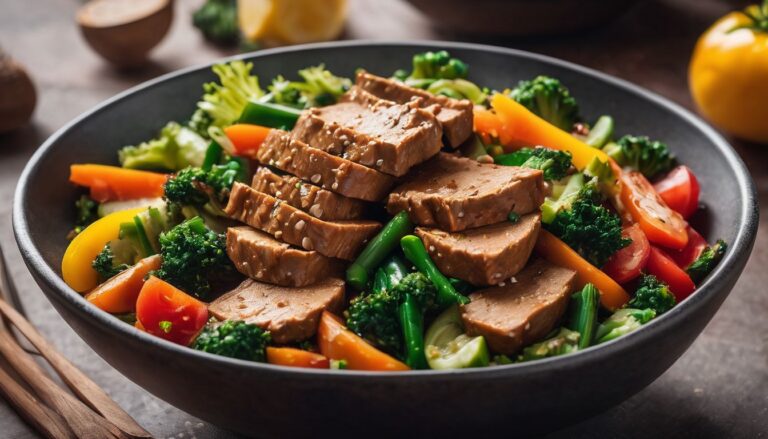A Comprehensive Guide To Egg Nutrition Facts And Health Benefits

Are you confused about everything that’s been said concerning the nutritional value of eggs? Don’t worry, eggs are a nutritional powerhouse packed with essential vitamins and high-quality protein.
This definitive guide will help clarify all the facts by giving you a comprehensive look at egg nutrition and health benefits. So, stay tuned to crack open some shell-shocking truths!
Key Takeaways
- Eggs are a nutritional powerhouse, providing essential vitamins, minerals, and complete protein.
- They offer numerous health benefits, including promoting heart health, supporting brain development, aiding in weight management, improving eye health, enhancing nutrient intake, and benefiting mental health.
- Some individuals may experience adverse effects or allergies to eggs. It is important to handle and cook eggs properly to minimize risks.
- Eggs come in various varieties and should be stored properly in the refrigerator to maintain freshness. Cooked eggs should be consumed within 3-4 days.
Nutritional Value of Eggs

Eggs are packed with nutritional value, making them a powerhouse food that provides essential vitamins, minerals, and complete protein.
Complete protein
Eggs pack a powerful protein punch. They deliver what’s known as complete protein, meaning it contains all nine essential amino acids our bodies can’t produce on their own. Each large egg offers about 6 grams of this high-quality protein, helping to build and repair body tissues including muscles and organs.
Besides the muscle-building benefits, proteins from eggs also support your immune system, help produce hormones, and aid in overall growth and development. Moreover, due to its satiating nature, this complete source of protein helps in managing weight by keeping hunger at bay between meals.
Essential vitamins and minerals

Eggs are a treasure trove of essential vitamins and minerals, key to maintaining vigorous health. They serve as a rich source of vitamin D, necessary for strong bones, boosting immune function and promoting cardiovascular health.
Eggs also bring on board the goodness of Vitamin B12 which aids in red blood cell formation and supports brain function. One large egg nutrition facts highlight the presence of selenium–an antioxidant that defends against cell damage and infections.
It’s worth noting how vital these nutrients are in our daily dietary intake for optimal physical and mental well-being. A single egg can provide us with an impressive range of these nutritional benefits while contributing to a balanced diet.
Health Benefits of Eggs

Eggs offer numerous health benefits, including promoting heart health, supporting brain development, aiding in weight management, improving eye health, enhancing nutrient intake, and even benefiting mental health.
Heart health

Eggs play a significant role in heart health. Contrary to old beliefs, the cholesterol found in eggs doesn’t raise blood cholesterol levels in most people. In fact, they contain nutrients like Omega-3 fatty acids that are beneficial for your heart.
These essential fats help reduce inflammation and maintain cardiovascular health. So incorporating eggs into a balanced diet can be part of an effective strategy for protecting your heart!
Eye health

Eggs are not only nutritious but also beneficial for maintaining good eye health. They contain important nutrients such as lutein and zeaxanthin, which can help protect the eyes from damage caused by harmful ultraviolet rays.
These nutrients have been associated with a reduced risk of age-related macular degeneration, a condition that can lead to vision loss in older adults. Eating eggs regularly as part of a balanced diet may contribute to keeping your eyes healthy and preventing age-related eye diseases.
Brain development

Eggs play a crucial role in brain development, thanks to their nutrient content. They are packed with essential vitamins and minerals that support cognitive function. For example, eggs are rich in choline, which is necessary for the production of acetylcholine, a neurotransmitter involved in memory and learning.
Additionally, eggs contain omega-3 fatty acids that help maintain healthy brain cell membranes. Furthermore, the vitamin B12 found in eggs supports nerve health and can enhance overall brain function.
By including eggs in your diet regularly, you can provide your brain with the nutrients it needs for optimal development and functioning.
Weight management

Eggs can be a helpful addition to a weight management plan. They are low in calories but high in protein, which can help increase feelings of fullness and reduce appetite throughout the day.
Research has shown that incorporating eggs into a breakfast routine can lead to greater weight loss compared to other morning meal options. Additionally, their nutrient density provides essential vitamins and minerals while keeping calorie intake in check.
By including eggs as part of a balanced diet, individuals may find it easier to maintain or achieve their weight loss goals.
Nutrient intake
Eggs are a powerhouse of essential nutrients, making them an excellent addition to your diet. They are packed with high-quality protein, vitamins, and minerals that are vital for optimal health.
Just one egg provides you with important nutrients such as vitamin D, vitamin B12, and selenium. These nutrients play a crucial role in supporting various bodily functions and promoting overall well-being.
By including eggs in your diet, you can ensure that you’re getting the necessary nutrients your body needs to thrive.
Mental health
Eating eggs can have a positive impact on mental health. Eggs contain important nutrients like choline and vitamin B12, which play a crucial role in brain function and mood regulation.
Choline helps with the production of neurotransmitters that regulate mood and memory, while vitamin B12 supports the production of red blood cells and promotes nerve health. By including eggs in your diet, you can support your mental well-being and maintain optimal brain function.
Adverse Effects and Allergies

Consuming eggs can have adverse effects and allergies in some individuals. While eggs are a highly nutritious food, they may not be suitable for everyone. Some people may experience allergic reactions to eggs, which can range from mild symptoms like hives and stomachache to more severe reactions like difficulty breathing and anaphylaxis.
It is important for individuals with egg allergies to avoid consuming eggs or any products that contain eggs. Additionally, some people may experience digestive issues after eating eggs, such as bloating or diarrhea.
In rare cases, salmonella contamination can occur in raw or undercooked eggs, leading to food poisoning. To minimize the risk of adverse effects and allergies associated with eggs, it is crucial to handle and cook them properly by thoroughly cooking the egg whites and yolks until both are firm.
Varieties and Storage

Eggs come in various varieties, such as chicken eggs, duck eggs, and even quail eggs. They differ in size, color (white or brown), and taste. No matter the variety, it’s important to store eggs properly to maintain their freshness and quality.
- Store eggs in the refrigerator at a temperature below 40°F (4°C) to prevent bacterial growth.
- Keep eggs in their original carton to protect them from absorbing odors and flavors from other foods.
- The shelf life of refrigerated eggs is approximately 4 – 5 weeks from the pack date.
- If you’re unsure about the freshness of an egg, perform the float test: place it in a bowl filled with water – a fresh egg will sink while an older one will float.
- Avoid storing eggs near strong – smelling foods as they can absorb these odors.
- Cooked eggs should be stored in a covered container in the refrigerator and consumed within 3-4 days.
Preparing Eggs

Preparing Eggs:
- Crack the egg into a bowl and beat it lightly with a fork.
- Add a pinch of salt and pepper to enhance the flavor.
- Choose your preferred cooking method, such as scrambling, frying, or boiling.
- If frying, heat a small amount of oil in a non – stick pan and pour in the beaten egg.
- Cook the egg over medium heat until the edges are set and the center is slightly runny for a soft scramble or fully cooked for a well-done scramble.
- If boiling, place the egg in a pot of boiling water for about 7-9 minutes for a hard-boiled egg or 4-5 minutes for a soft-boiled egg.
- Once cooked, remove from heat and let it cool slightly before peeling.
Incorporating Eggs into Your Diet

Incorporating eggs into your diet is a simple way to boost your nutrition and enjoy their health benefits. Here are some ideas on how to add eggs to your meals:
- Start your day with scrambled eggs or an omelet for a protein – packed breakfast.
- Add hard – boiled eggs to salads for a satisfying lunch.
- Whip up a frittata or quiche for a delicious dinner option.
- Use eggs as a binding agent in meatloaf, meatballs, or veggie burgers.
- Make homemade egg salad or deviled eggs for a tasty snack.
- Try baking with eggs in cakes, cookies, and bread recipes.
- Use eggs as the base for homemade mayonnaise or salad dressings.
Conclusion

In conclusion, eggs are a nutritious and versatile food that provide numerous health benefits. With their high-quality protein, essential vitamins and minerals, eggs can support brain development, eye health, weight management, and overall well-being.
Additionally, eggs are an affordable option for cooking and baking. Remember to handle and prepare eggs safely to reduce the risk of foodborne illnesses. Start incorporating eggs into your diet today for a boost of nutrients and delicious meals!
FAQs
1. What are the nutrition facts of a boiled egg?
Boiled egg nutrition facts show that they contain protein, omega 3 fats, and essential nutrients such as cholesterol but in limited quantities.
2. Is there any difference between brown and white egg’s nutritional values?
The nutrition facts for both brown eggs and white eggs are similar; however, organic large brown eggs may have additional health benefits if they come from free-range chickens.
3. Do hard-boiled eggs without yolk still offer good nutritional value?
Yes, hard-boiled egg nutrition facts without yolk show lower cholesterol levels while still providing protein content.
4. Are fried eggs nutritious too?
Fried egg nutrition facts reveal that frying an egg can slightly increase its calorie content; however, it will not alter the high-quality protein or other nutrients found within the egg.
5. How does chicken-egg stack against duck-egg in terms of nutritional value?
Chicken and duck egg nutrition facts largely vary with ducks’ offering more Omega-3s fatty acids but also contains higher fat content than chicken ones.
6. Is one type of cooking method preferably better regarding preserving most of an Egg’s Nutrition Facts?
For minimal impact on its overall nutritions’, hard boiling or baking is highly recommended according to various studies on different methods like scrambled or over easy etc which could alter some inherent nutrient composition.
Sources referenced in this article
- https://www.everydayhealth.com/diet-nutrition/diet/eggs-health-benefits-nutrition-calories-more/
- https://www.eggs.ca/nutrition/view/1/egg-nutrition
- https://www.webmd.com/diet/health-benefits-boiled-eggs
- https://www.webmd.com/diet/health-benefits-eggs
- https://www.medicalnewstoday.com/articles/283659
- https://www.beachbodyondemand.com/blog/guide-to-egg-nutrition-facts
- https://www.dietdoctor.com/nutrition/eggs

Author
Years ago, the spark of my life’s passion ignited in my mind the moment I stepped into the local gym for the first time. The inaugural bead of perspiration, the initial endeavor, the very first surge of endorphins, and a sense of pride that washed over me post-workout marked the beginning of my deep-seated interest in strength sports, fitness, and sports nutrition. This very curiosity blossomed rapidly into a profound fascination, propelling me to earn a Master’s degree in Physical Education from the Academy of Physical Education in Krakow, followed by a Sports Manager diploma from the Jagiellonian University. My journey of growth led me to gain more specialized qualifications, such as being a certified personal trainer with a focus on sports dietetics, a lifeguard, and an instructor for wellness and corrective gymnastics. Theoretical knowledge paired seamlessly with practical experience, reinforcing my belief that the transformation of individuals under my guidance was also a reflection of my personal growth. This belief holds true even today. Each day, I strive to push the boundaries and explore new realms. These realms gently elevate me to greater heights. The unique combination of passion for my field and the continuous quest for growth fuels my drive to break new ground.















